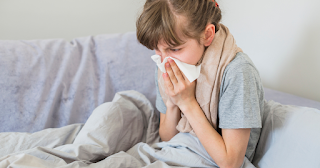UW Med: Young children are being hit hard by RSV (respiratory syncytial virus) and influenza
Friday, November 25, 2022
 |
| Photo courtesy UW Med |
These viruses come every winter, but the surge is happening early this year and involving many more children than usual.
As a result, primary care clinics, urgent care sites, emergency rooms and hospitals are all extremely busy.
We want to help you stay out of clinics or emergency rooms if you do not need to be there. But we also want to be sure you recognize when your child needs medical care.
What is RSV?
We want to help you stay out of clinics or emergency rooms if you do not need to be there. But we also want to be sure you recognize when your child needs medical care.
What is RSV?
RSV is one of the many viruses that cause respiratory illness ― illnesses of the nose, throat and lungs. For most children and adults, RSV causes a cold. Cold symptoms can usually be managed at home and generally last 7-10 days.
Cold symptoms include:
Severe RSV:
- Fever (temperature of 100.4 Fahrenheit or higher)
- Cough (dry or wet sounding)
- Congestion
- Runny nose
- Sneezing
- Fussiness in children and poor feeding
- Use acetaminophen or ibuprofen to treat fever or pain, such as a sore throat.
- Use a humidifier or vaporizer to add moisture to the air in your home. This can help ease congestion and coughing. Be sure to keep the humidifier clean to prevent the growth of bacteria and molds.
- Drink fluids. Continue breastfeeding or bottle-feeding your infant as you would normally. For older children and adults, stay hydrated with water, warm fluids, such as soup, or ice pops to soothe a sore throat.
- Feed infants smaller amounts and more frequently to allow them to catch their breath.
- Keep your baby’s nose clear of mucous.
- Try saline nasal drops. Non-prescription drops are a safe, effective way to ease congestion, even for young children. Follow instructions on the product.
- Stay away from cigarette smoke. Secondhand smoke can aggravate symptoms.
Severe RSV:
Some children experience RSV infections that are more severe. For example, very young babies, children born prematurely, and those with a chronic medical condition (such as a heart defect or asthma) are at increased risk of severe disease. But even healthy children can become sick when RSV moves down into the lungs to cause bronchiolitis or pneumonia.
Children with severe RSV have cold symptoms but also signs of respiratory distress:
When to Get Help:
Children with severe RSV have cold symptoms but also signs of respiratory distress:
- Fast breathing
- Pauses in their breathing
- Flaring of the nostrils and head bobbing with breathing
- Rhythmic grunting during breathing
- Belly breathing, tugging between the ribs and/or the lower neck
- Wheezing
- Blue coloration of lips, mouth or skin
When to Get Help:
You know your child best. If you are concerned that this is more than a cold, please seek help.
Call your child’s primary care provider or seek urgent care if your child:
Staying Healthy:
- Is less than 8 weeks old and has any fever above 100.4 degrees Fahrenheit.
- Has a sustained fever over 104 degrees F, no matter their age.
- Is lethargic or hard to arouse.
- Has any signs of respiratory distress (listed above).
- Has signs of dehydration (no tears, dark urine, very dry mouth).
- Has RSV symptoms along with a chronic health condition, such as a heart defect or lung disease.
Staying Healthy:
Even when RSV and influenza are moving through the community, we can help keep our family and children safe. See also Time To Increase Protection Against Surging Respiratory Viruses for advice from Public Health – Seattle - King County.




0 comments:
Post a Comment